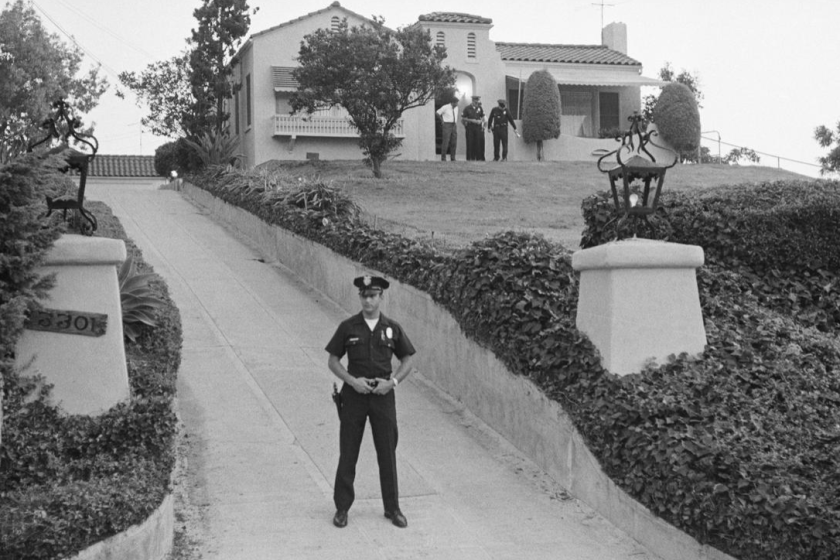Here’s why Lancaster’s mayor wants workplaces to be necktie-optional

Lancaster Mayor R. Rex Parris is declaring war on neckties.
The well-known litigator has worn ties all his life, saying he “could buy a car” with the amount of money he’s spent on them.
But this week, Parris proposed that the city consider banning local employers from requiring workers to don the neckwear. It’s a matter of public health, he said.
Last week, the mayor was reading the blog Big Think when he came across a post on a new study that suggests wearing neckties may lower blood flow to the brain. The blog post contends that restricting circulation by such an amount — 7.5% on average, according to the research — could have fatal implications for someone with high blood pressure. And prior research shows that cerebral circulation is associated with creativity.
“I spend a lot of hours every week on an elliptical or a bike just to increase blood flow to my brain,” Parris said, “and it turns out every morning when I put on a tie I’m diminishing it.”
The mayor’s proposal comes at a tenuous time for the tie.
The late Steve Jobs’ iconic uniform of black turtleneck and blue jeans — sans tie, of course — inspired many a think piece, and a generation of techies followed suit. (Good luck spotting a tie on the Facebook campus.)
In 2015, the New York City Commission on Human Rights released guidance on gender identity and gender expression protections, which clarified that employers who enforce policies that require men to wear ties or women to wear skirts could technically be violating the law.
JPMorgan introduced a business casual clothing policy in 2016. The next year, even the notoriously formal British Parliament dropped ties from its male dress code.
And over the last five years, there’s been a 10% jump in employers that allow casual dress any day of the week. About half of U.S. companies now permit a more relaxed wardrobe, according to the Society for Human Resource Management.
But the question of ties as a health hazard has rarely entered the discussion.
Parris said he wants Lancaster employers to make wearing ties to work optional at the very least. He likened the tie requirement to demanding that women wear heels to work, characterizing it as an issue of compelled gender presentation.
“I don’t think it’s appropriate in America today to make anyone do something that is now known to be detrimental to your health,” Parris said. “Especially if it’s based on gender.”
Parris said he wasn’t sure how many Lancaster employers require neckties but added that city department heads customarily wear them to work.
At a council meeting Tuesday, he asked the city attorney to look into whether a ban on dress codes requiring ties for workers is feasible. Because the policy would involve issuing infractions to offending employers, Parris has asked the city’s Criminal Justice Commission to look into whether such a rule is practical.
Michael Colantuono, an expert in municipal law who serves as city attorney for Auburn and Grass Valley, said he’s never heard of a city similarly attempting to regulate clothes worn by workers at private businesses. Any city that tried to impose a necktie policy on a local employer could run into legal problems, he said.
Hypothetically, a company could sue the city for infringing on its freedom to enforce a particular dress code, Colantuono said. The court would probably look into whether such a burden on private activity is justified, he said.
California cities have the power to regulate private activity within their boundaries, as long as the regulation is necessary to the health and safety of residents. So in this case, the city would need to prove that the neckties are actually a public health nuisance.
City Atty. Allison Burns said she has just begun to look into those issues and couldn’t yet say whether the ordinance would hold up in court.
Parris said he’s well aware the ordinance could be overturned, but he’s not worried about it. Unlike other mayors, he said, he isn’t afraid of litigation.
“I’m aware I’m going out on a ledge, but I live my life on ledges,” Parris said. “We’re interested in going in a positive direction until we’re stopped.”
Parris has not stopped wearing ties quite yet. That’s because most courts require attorneys to wear “business attire” in the courtroom, and for most judges that means wearing a tie.
Parris said he was unable to affix a tie when he broke his hand about 30 years ago, so he showed up to court without one. He was promptly reprimanded by the judge.
Steven Derryberry, managing partner of the Lancaster law firm Kestler Derryberry, said he would welcome the anti-necktie rule. He doesn’t require ties in his office, though his attorneys are asked to wear them for court appearances.
“As hot and warm as it is in the Antelope Valley after Memorial Day, it’s too uncomfortable to wear ties anyway,” Derryberry said. And if the study’s claims are true, Derryberry added, people should stop wearing ties altogether, even in court.
But Atlanta menswear stylist Aaron Marino said professionals should think twice before ditching the tie. Corporate America may be loosening dress codes, but fashionable young men are actually wearing more ties than in years past, he said.
The tie is more than just a tie, he said. It conveys a polished sophistication that could make all the difference for those early in their careers. It draws the eye to the face. It symbolizes confidence and care in an increasingly competitive world.
Marino is clearly a crusader for the tie. And he just doesn’t buy the recent study’s claims.
“If you’re wearing a necktie and it’s cutting off circulation to your brain, your collar isn’t the proper size. It’s too tight,” he said. “Don’t blame the tie.”
For the study, researchers at the University Hospital Schleswig-Holstein in Germany scanned the brains of 30 men, half of whom wore neckties. A third of the men in the necktie group experienced at least a 10% drop in blood flow.
Because of the study’s small sample size, Parris has asked the city’s Healthy Community Commission to check its reliability.
The study does not explain how the 7.5% average decrease in blood circulation might affect brain function. But generally speaking, poor cerebral blood flow can lead to brain tissue death and result in stroke, hemorrhage and other conditions, according to Healthline.
This isn’t the first time neckties have gotten a bad rap. A 2003 study published in the Journal of Ophthalmology showed that wearing ties too tightly may increase the risk of blindness and glaucoma.
As for whether the distinctly Western bolo tie would be included in any Lancaster ordinance, Parris isn’t particularly worried about them; it’s not as if employers are encouraging workers to wear those, he said.
Twitter: @lauramnewberry
UPDATES:
7:40 p.m.: This article was updated with comments from Marino, Colantuono and Burns as well as additional comments from Parris and background about his proposal and tie workplace rules in general.
This article was originally published at 5 a.m.
More to Read
Start your day right
Sign up for Essential California for news, features and recommendations from the L.A. Times and beyond in your inbox six days a week.
You may occasionally receive promotional content from the Los Angeles Times.







